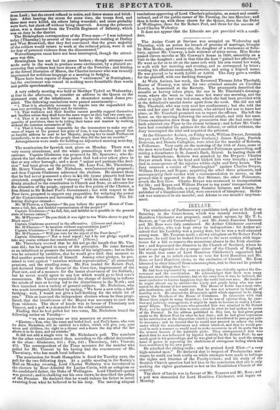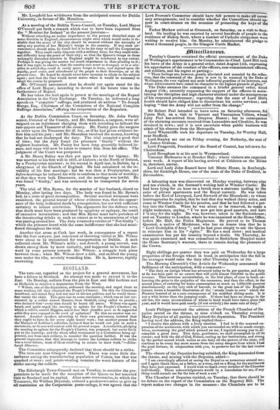IRELAND.
The nomination of Parliamentary candidates took place at Belfast on Saturday, in the Court-house, which was densely crowded. Lord Hamilton Chichester was proposed, amid much uproar, by Mr. T. L. Stewart, as "an old Conservative " ; and Mr. James Emerson Tennent and Mr. Ross were duly nominated. Sir Arthur Chichester answered for his relative, who was kept away by indisposition : Sir Arthur ad-
mitted that his Lordship was a young man, but he was a well-educated young man. Mr. Tennent made a showy eulogium on Sir Robert Peel's
measure : he said that he looked forward to the next session with impa- tience for a bill to remove the monstrous abuses in the Irish election- law ; and deprecated the disunion in the Church of Scotland, whom he had always regarded as the younger sister of the Church of England. He stated that some of Lord Hamilton Chichester's supporters had gone so far as to solicit electors to vote for Lord Hamilton and Mr. Ross, or Lord Hamilton alone, to the exclusion of himself. Mr. Ross laboured to clear himself from misconception, and to that end he praised many of the things that be-
lie Lad been represented by some as speaking too violently against the Go- vernment and the constitution. He acknowledged that there were many
blemishes about the constitution ; but at the same time it was, he believed, the most conducive to human happiness that the world had ever seen. He loved— he might almost say he adored—the lovely and gentle being who was now
seated on the throne of her ancestors. The House of Lords was a most valu- able institution, and he would say that he was not actuated by feelings of hostility to it. He admired the Democratic spirit which appeared to be rising
among the Members of the House of Commons. In connexion with that
House there might be many blemishes ; but he was of opinion that, by exer- tion and judicious management, it might be made to become in reality a Com-
mons' House. The gentleman who preceded him was attached to Sir Robert
Peel ; and he agreed with him to some extent in what he bad spoken in praise of the Premier. In his address published in May last, he had given great
credit to Sir Robert Peel for what he bad done ; and he had given expression to his satisfaction at the disposition which be had manifested to pass good pub- lic measures ; and he trusted that he would now proceed to relieve the evils under which the manufacturers and others laboured, and that he would pro-
ceed in such a manner as would tend to make commerce in all its parts free to the utmost bounds of the habitable globe. They misrepresented him who Stated that he was influenced by bigoted hostility to Sir Robert Peel: he saw much good in his proceedings, and he was glad to find that he used the strong hand of power in repressing the ebullitions of outrageous feeling which had been manifested by his own party.
He attacked the sliding-scale ; and be praised Lord Eliot—" a very high-minded man." He declared that in respect of Presbyterian mar-
riages be could not look coolly on while attempts were made to infringe the rights and liberties of the Presbyterians ; and his study of the Scottish Church question had led him to the conclusion that she is only seeking the rights guaranteed to her as the Established Church of the country. The show of hands was in favour of Mr. Tennent and Ur. Ross ; and a poll was demanded for Lord Hamilton Chichester, and begun on Monday.
Mr. Longfield has withdrawn from the anticipated contest for Dublin University, in favour of Mr. Hamilton.
At a meeting of the Dublin Town-Council, on Tuesday, Lord Mayor O'Connell put forth a remark which was to have been expected from the "Member for Ireland "at the present juncture— Without attaching an undue importance to the present disturbed state of some districts in England, circumstances might arise which would make it de- sirable that the peace of the city should be secured without the necessity of using any portion of her Majesty's troops in the country. If any such cir- cumstances should arise, he would feel it to be his duty to call the Corporation together. They could easily dispense with a military firm, for they could with- out difficulty keep the peace of their city; BO that the Queen's troops in those unhappily disturbed districts in England might be reinforced to any extent. Perhaps it was giving the matter too much importance in thus alluding to it ; but it was right to observe, that the country was never so tranquil, or in a situ- ation in which they could so easily spare troops to leave, and depend upon the loyalty, good order, and attachment of the people to their Sovereign, as at the present time. He hoped he should never have occasion to allude to the subject again; and that the time would never arrive when it would be necessary to adopt the course he proposed. Mr. O'Connell announced that he should not again stand for the office of Lord Mayor ; intending to devote all his future time to the furtherance of Repeal.
Be has taken the lead again in person at the meetings of the Repeal Association in the Corn Exchange. On Tuesday, he delivered a long speech on "complete" suffrage, and produced an address "To Joseph Sturge, Esq., Chairman of the Committee of the National Complete Suffrage Association," offering the cooperation of the Repealers.
At the Dublin Commission Court, on Saturday, Mr. John Pasley senior, Coroner of the County, and Mr. Shanahan, a surgeon, were ar- raigned on an indictment charging them with intending to defraud the rate-payers and Treasurer of the comity. Mr. Pasley gave the surgeon an order upon the Treasurer for 3/. 108., as if he had given evidence be- fore him and his jury ; and Mr. Shanahan received the money, knowing that he had not discharged the duty. The trial occupied a good deal of time; but the Jury found the prisoners " Guilty " without the slightest hesitation. Mr. Pasley has been long generally believed in- sane, and steps will now be taken to remove him from his office. The judgment of the Court was postponed.
A Mr. Henry Bailey was then put upon his trial for bigamy. He was married to his first wife in 1831, at Lisburn ; in the North of Ireland, by a Presbyterian minister; to his second in April last, in Dublin, by a clergyman of the Church of England. He had calculated on the in- validity of his first marriage; but he was then a Presbyterian, and before marriage he induced his wife to conform to that mode of worship; so that they were both Dissenters, and the marriage was lawful. He was found "Guilty," and was sentenced to be transported for seven years.
The trial of Mrs. Byrne, for the murder of her husband, closed on Monday, after lasting two days. The body was found in Mr. Byrne's bed, in a state of great decomposition. Several medical witnesses were examined, the general tenour of whose evidence was, that the appear- ance of the body indicated death by strangulation, but not with sufficient certainty to induce conviction. The arguments for the defence were, that death must have been produced by apoplexy or epilepsy, the result of excessive intoxication ; and that Mrs. Byrne must have partaken of the intoxicating drinks to such an extent as to be unconscious of what was passing around her. The Jury returned a verdict of "Not Guilty"; which the prisoner heard with the same indifference that she had mani- fested throughout the trial.
Another riot arose at Cork last week, in consequence of a report that the four sawyers just convicted of throwing vitriol at Mr. Wilson were about to be transmitted for transportation to Dublin. A mob collected about Mr. Wilson's mills ; and Jowell, a young recruit, was drawn among them by mere curiosity, and happened to be thrust for- ward by some persons towards Mr. Wilson : a straggle took place between them ; when Mr. Wilson drew a dirk, and stabbed the young man under the ribs, severely wounding him. He is, however, rapidly recovering.



























 Previous page
Previous page